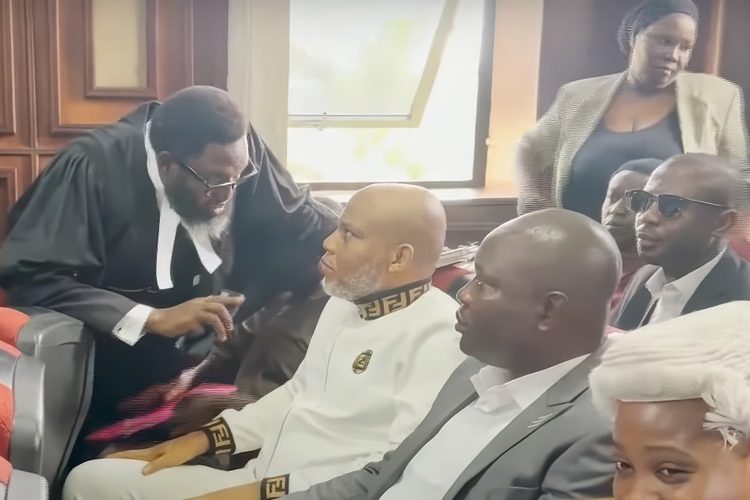The Federal High Court in Abuja temporarily halted proceedings in the ongoing trial of Nnamdi Kanu, the leader of the banned Indigenous People of Biafra (IPOB), on Wednesday to decide on the admissibility of important evidence that the Federal Government had presented, according to a report by Newswire Law & Events.
The court made this procedural decision following the conclusion of a trial-within-a-trial to determine whether extrajudicial statements purportedly made by Kanu while in custody were obtained voluntarily.
The Report
The Federal High Court sitting in Abuja has temporarily halted proceedings in the trial of Nnamdi Kanu, leader of the proscribed Indigenous People of Biafra (IPOB), to deliver a ruling on whether key pieces of evidence tendered by the Federal Government will be admitted.
This procedural development followed the conclusion of a trial-within-a-trial ordered by presiding judge, Justice James Omotosho, to determine the voluntariness of extra-judicial statements attributed to Kanu while in custody.
“A court’s acceptance or rejection of evidence procured under contested circumstances is more than a procedural decision; it is a test of a nation’s justice system.”
What Led to the Trial-Within-a-Trial
During the session, Kanu’s defence team, led by Paul Erokoro, SAN, objected to the admissibility of the extra-judicial statements, alleging they were obtained under duress while Kanu was in the custody of the Department of State Services (DSS).
The defence claimed Kanu was denied access to his lawyers, threatened with prolonged detention, deprived of medical care, and held in solitary confinement in an underground cell. He further accused DSS operatives of coercing him to make statements implicating former President Goodluck Jonathan and former Imo State Governor Rochas Okorocha.
Additionally, the defence challenged the credibility of video evidence tendered by the prosecution, alleging it was selectively edited to misrepresent facts.
Government’s Response
The Federal Government’s counsel, Suraj Saida, SAN, countered these allegations by presenting a DSS operative as a witness. The operative denied any wrongdoing, maintaining that Kanu was treated fairly, allowed bottled water during interviews, and never threatened or pressured.
The witness insisted that all interrogations followed due legal procedures and constitutional protections, asserting that the extra-judicial statements were made voluntarily.
What’s Next?
Justice James Omotosho is expected to deliver his ruling on the admissibility of the disputed statements once he reviews submissions from both parties. The court’s decision will determine whether the statements will form part of the substantive trial moving forward or be discarded for having been allegedly obtained under duress.





